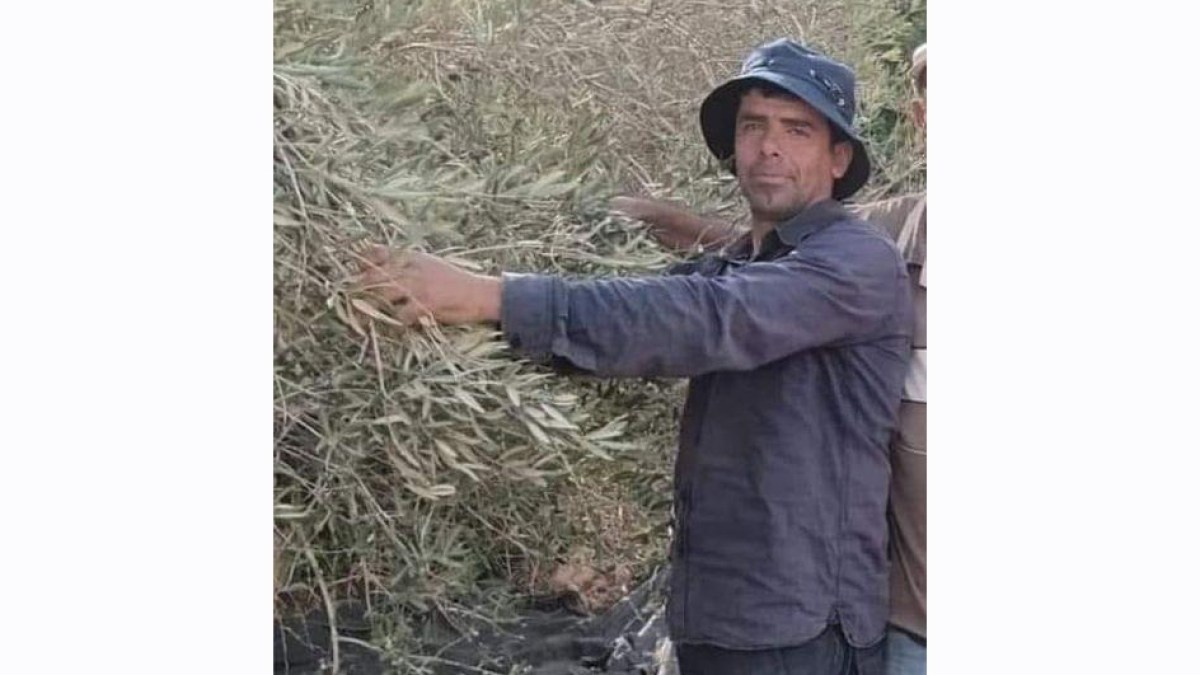Nablus in the occupied West Bank – It was Saturday morning, and Bilal Muhammad Saleh, 40, was harvesting olives from the small plot of land he inherited from his father in the village of Al-Sawiya, 18 kilometers (11 miles) south of Nablus.
As is usual during the Palestinian olive season, most of the family members were there to help. His wife and four children, as well as his siblings and some other family members, were there when an Israeli settler shot him in the chest.
His uncle Yasser Shaheen says: “Bilal was a poor, hardworking man of the land.” “He has struggled all his life, ever since he was orphaned at a young age.”
He was with Bilal and other relatives on Saturday morning when the Israeli army told the family they had three minutes to leave their land.
He says: “The soldiers knew that the settlers would attack us, and they did not stop them.”
Translation: His name is Bilal. His face is familiar to many passers-by in downtown Ramallah, where he used to sell sage, thyme, thyme, figs, and prickly pears. He is 40 years old and is from the village of Al-Sawiya, south of Nablus. This good and simple man went out to pick olives this morning, and one of the settlers killed him with a bullet in the chest.
Al-Sawiya and its 3,500 residents are surrounded by illegal Israeli settlements that stifle daily life. The villagers own 12,000 dunams (1,200 hectares or 2,965 acres) of land, but they can only build or work on 600 dunams. The rest is controlled by Israel.
The head of the village council, Nihad Arar, says: “Everything needs to be reviewed by the Israeli occupation and obtained its approval, from picking olives on our lands to construction and other matters of life.”
He says settlers in illegal settlements attack and harass villagers “all year round.” “[They] They cut down our trees, burn our farms, steal our olives, and are known to attack Palestinians inside their homes and on their private property.
Everyone’s favorite herbalist
Bilal was a familiar face in downtown Ramallah, where he went every day after collecting herbs and wild plants from the hills near his village.
He had dropped out of high school and become a tile worker, like his brother, until he began venturing into the hills to collect wild herbs to sell.
He sold sage, sumac, and thyme, as well as figs and prickly pears when they were in season. Of course, he harvested olives in season.
Hazem Shaheen, Bilal’s son-in-law, says that settlers from Rahalim had previously attacked the family while they were picking olives.
He says: “They steal our ladders and our olives, all under the protection of the Israeli army, which stands by.”
“They are encouraging settlers to attack us. We can hardly work our land and have to go secretly. “Every year they attack us.”
The Israeli army did not respond to Al Jazeera’s request for comment at the time of publication.
Some Israeli news reports on Monday said that Bilal’s attacker was an off-duty soldier and that he had been brought in by Israeli military police.
Hazem says that on Saturday morning he saw four settlers wearing religious clothing heading towards the place where Bilal was picking olives with his family.
Yasser says that he “asked Bilal and his family to move away and come closer to us so that we could be together.”
He says: “The settlers started approaching us, shouting and cursing, and from a distance of 100 meters, one of them fired a single bullet.”
The bullet hit Bilal in the chest. He fell to the ground from the ladder he was on.
Hazem explains how they “left everything behind, carried it up the stairs and ran between the trees to the main street.”
“We put him in a private car and took him to Salfit Hospital, 15 kilometers (9 miles) away,” Yasser says. But unfortunately, Bilal was declared dead upon arrival.
Hazem says that Bilal’s wife and children, the youngest of whom is nine years old, “feel terrified and have not stopped crying.”
His wife, Ikhlas, is still in shock. “He just wanted to protect me and the children. We got scared when the settlers got too close to us so he went to confront them. None of us expected them to shoot him like that.”

“Beer buff. Devoted pop culture scholar. Coffee ninja. Evil zombie fan. Organizer.”




/cdn.vox-cdn.com/uploads/chorus_asset/file/25550621/voultar_snes2.jpg)


More Stories
Two children killed, 11 injured in stabbing attack at Taylor Swift dance party in UK, 17-year-old arrested
Fiber optic communications networks are being sabotaged – DW – 07/29/2024
Putin warns US against deploying long-range missiles in Germany | NATO